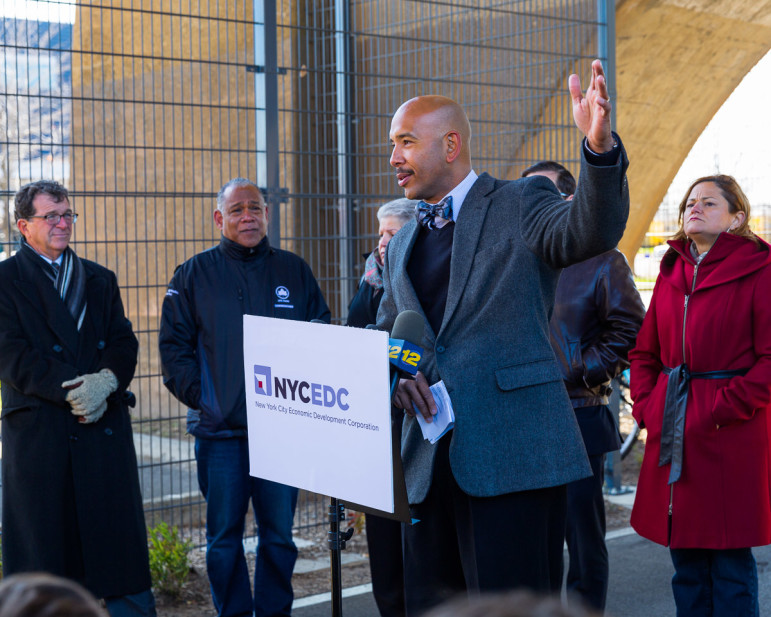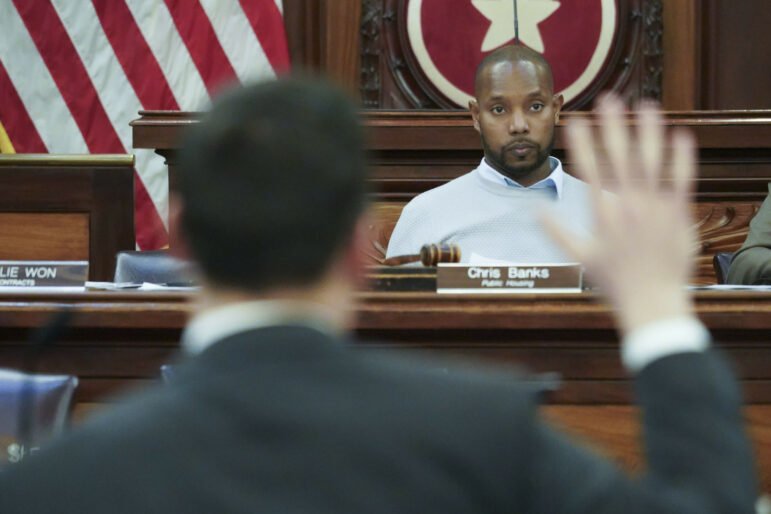
Bronx Borough President's Office
The BP, with Council Speaker Melissa Mark-Viverito behind him, at a ribbon-cutting last weekend.
Bronx Borough Ruben Diaz, Jr. has been under fire recently for his insensitivity to the pressures, past and present, on Bronx neighborhoods: His attendance at a “the Bronx is burning“-themed Halloween party ruffled a few feathers. And whether it was backing the city-subsidized move of Fresh Direct from Queens to Mott Haven, or dismissing some anti-gentrification activists as “anarchists,” the beep hasn’t been known as a foe of development.
But when it comes to Mayor de Blasio’s development ambitions, embodied in two zoning proposals intended to pave the way for more density and more subsidized housing, Diaz is standing with the skeptics. His Bronx Borough Board (consisting of Diaz, the councilmembers from the Bronx and the chairs of the borough’s 12 community boards) voted 19-0 against City Hall’s zoning proposals Thursday, with one abstention..
Here’s the statement Diaz issued after the vote:
It is clear today that The Bronx stands united in one voice in opposition to these two proposals—”Zoning for Quality & Affordability” and “Mandatory Inclusionary Housing”—that Mayor de Blasio has put forward for our consideration. I add my voice to that opposition today, and I cast my vote against these items.
So many different groups, organizations, and other concerned citizens came before our boards and my office to voice their concerns about these proposals. And so many different communities have different reasons to be opposed to this “one size fits all” approach to the future development of our borough and our city.
The “neighborhood by neighborhood” approach to planning has been very successful in The Bronx. The borough has adopted no less than 14 rezonings since 2009. These proposed text amendments go against the grain of this successful approach to community-based planning, and must be rejected. One size does not fit all.
Despite the impact these combined proposals will have on density within our city, this administration has failed to discuss the social and physical infrastructure necessary to accommodate this new development. How will the additional seniors be serviced? Are there enough school seats for the children accompanying their parents as they move into new affordable units? Will existing transit options be able to handle a new influx of commuters? These questions, and many others, remain asked and unanswered.
One issue, the elimination of parking requirements, has been met with universal concern. The half-mile distance proposed from subway stations is too far to be considered a convenient walking distance. Additional criticisms are that, as the plan stands, The Bronx could be left out of opportunities for both low and moderate-income housing.
When real estate professionals and community housing advocates who seldom agree on anything have put forward serious criticisms of these text amendments, it is clear that what is being proposed is wrong for this borough and this city.
One universal critique of Mayor de Blasio’s proposal that has resonated across every community in this borough, and in fact across the city, is the speed of the process. Sixty days is not enough time to consider a massive, fundamental change to how development works in this city. In fact, the accelerated timeline this administration has imposed on us seems designed to limit community input, and to force us to accept these changes as written.
Mayor de Blasio and the Department of City Planning are moving too fast. These proposals must be reconsidered.
These are tremendously flawed proposals that, if adopted, would remove public input from the development process and attempt to paint future development of our unique communities with one broad brushstroke.
Allowing just 60 days for our community boards to weigh in on these proposals is disrespectful to the boards, their members and the neighborhoods they serve, and goes against the spirit of progressive, inclusionary and transparent government.
As chairman of this board, I speak for all of us in urging the City Council and our speaker, Melissa Mark-Viverito, to heed the united voices of The Bronx—and the growing chorus of opposition in every corner of this city—and to stop this proposal when it comes before the City Council.
It’s worth noting that the timeline for considering the de Blasio proposals appears to be what’s called for under the city’s decades-old ULURP process.








